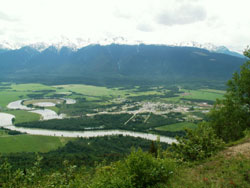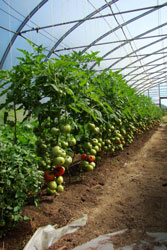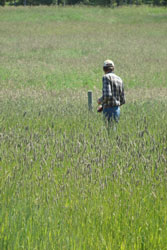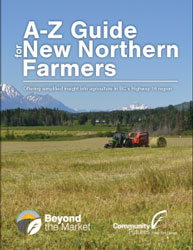
About the author: Jillian Merrick is the coordinator of the Beyond the Market project. She resides in Prince George, BC and works in rural communities across the North. She has earned degrees in Economics and International Studies from the University of Northern British Columbia and is an active community developer in both work and volunteer capacities.
 The BC Highway 16 corridor stretches across the middle of the province, from the Alberta border to the west coast. Here, local economies struggle to adapt to drastic change. The region was once dominated by the forestry sector, but with the mountain pine beetle crisis, a declining US housing market, and rising input costs, many mills have closed. Earnest efforts are being made to keep residents from leaving, and in many cases, agriculture is seen as a viable economic diversification option.
The BC Highway 16 corridor stretches across the middle of the province, from the Alberta border to the west coast. Here, local economies struggle to adapt to drastic change. The region was once dominated by the forestry sector, but with the mountain pine beetle crisis, a declining US housing market, and rising input costs, many mills have closed. Earnest efforts are being made to keep residents from leaving, and in many cases, agriculture is seen as a viable economic diversification option.
 In fact, agriculture has always been an important economic driver in the area, so when community leaders along the Highway 16 corridor called for programming to support the regional agriculture sector in 2010, Community Futures Fraser-Fort George stepped up to the plate with a suite of initiatives under the label, Beyond the Market. Originally planned to last 18 months, the economic development project stumbled upon a wealth of opportunity and is now entering its fourth year serving the needs of northern farm operators.
In fact, agriculture has always been an important economic driver in the area, so when community leaders along the Highway 16 corridor called for programming to support the regional agriculture sector in 2010, Community Futures Fraser-Fort George stepped up to the plate with a suite of initiatives under the label, Beyond the Market. Originally planned to last 18 months, the economic development project stumbled upon a wealth of opportunity and is now entering its fourth year serving the needs of northern farm operators.
One of Beyond the Market’s sub-projects was the New Farm Development Initiative. Between the fall of 2012 and spring 2014, it worked to increase the number and success of new farmers in the Highway 16 corridor by offering agricultural training and internship programs; educating potential farmers about the region’s agricultural opportunities and challenges; and increasing access to farmland and capital.
 While northern regions are challenged by more extreme climates, shorter seasons, smaller populations, and fewer support services spread over a massive geographical area, there is a distinct advantage to farming in the north: land. Northern BC is characterized by vast expanses of relatively affordable farmland, abundant fresh water, and fewer pressures from commercial and residential land development.
While northern regions are challenged by more extreme climates, shorter seasons, smaller populations, and fewer support services spread over a massive geographical area, there is a distinct advantage to farming in the north: land. Northern BC is characterized by vast expanses of relatively affordable farmland, abundant fresh water, and fewer pressures from commercial and residential land development.
Agriculturalists in the south make it clear that land prices are the biggest challenge to new farm startup; however, in the north, the majority of new farm clients that work with the Beyond the Market project have already invested in a land base. Instead, northern farmers typically lack access to the information, networks and marketplaces they need for commercial success.
 Beyond the Market has focused on meeting the needs of new and experienced farmers alike. The project has created a strong community-based network and successfully facilitated purchasing relationships between producers and buyers, farmland leases for new farmers, and new farm-based employment. The recent publication, the A-Z Guide for New Northern Farmers, summarizes much of the project work to date and can be downloaded from the project website at www.beyondthemarket.ca.
Beyond the Market has focused on meeting the needs of new and experienced farmers alike. The project has created a strong community-based network and successfully facilitated purchasing relationships between producers and buyers, farmland leases for new farmers, and new farm-based employment. The recent publication, the A-Z Guide for New Northern Farmers, summarizes much of the project work to date and can be downloaded from the project website at www.beyondthemarket.ca.
We believe both that our region is vitally important to the future of agriculture in the province and that agriculture is essential to the viability of our rural and remote communities now and into the future.
————————————————————————————–
Sustainable Food Systems is one of the Real Estate Foundation’s grant program focus areas. We have a particular interest in supporting land use initiatives that remove barriers and/or contribute to new approaches and practices for sustainable food systems in BC. Our $15,800 grant to Community Futures Fraser-Fort George helped with the New Farm Development Initiative from 2012-2014.
See also:
- More Sustianable Food Systems blogs in the News section of our website (series published Sept-Oct 2013 and May-June 2014).
- Reports and guidebooks in the Resources section or via the Projects page (filter results for Sustainable Food Systems).
SHARE